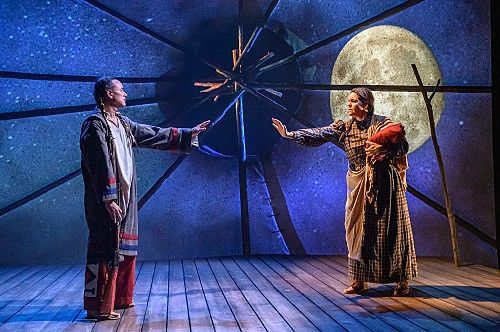
Moses’s classic play is ‘astonishingly impactful and heartbreakingly important’
Daniel David Moses’s classic play Almighty Voice and His Wife comes to Soulpepper, playing at The Young Centre for Performing Arts. Almighty Voice (or Kitchi-manito-waya, meaning “Voice of the Great Spirit”) was a Cree warrior, born around 1875 on the One Arrow Reserve in Saskatchewan. Arrested for shooting a cow, Almighty Voice escaped jail in fear of being hung.
Pursued by the RCMP, Almighty Voice killed a Mountie and spent the next two years on the run. It took a hundred Mounties and a cannon, but Almighty Voice was eventually killed. Very little is known about the real Almighty Voice so Moses’s play re-imagines Almighty Voice’s life through a lens of love.
The production is deeply affecting. James Dallas Smith laughs, dances, and hunts as the carefree and resourceful Almighty Voice. Michaela Washburn rages and soothes as the wild and loving White Girl. We witness their life and their love, and hear stories about their community and how it has been ravaged by European settlers.
As the story of White Girl and Almighty Voice unfolds, the audience gets glimpses into the hardships of living on reserve. Almighty Voice’s father is held in jail; White Girl’s mother dies of starvation when supplies fail to make it to their reserve during winter. Traditional Indigenous ways of living are continually disrupted.
The idea of boundaries is constantly played with throughout the production. Glass, a marvel that White Girl calls a wall you can see through, becomes an emblem for an all-seeing god and a symbol of the land boundaries that are crossed. This becomes a perfect analogy for the juxtaposition of knowledge and culture and the uneven power dynamics between European and Indigenous peoples.
Identity and symbolism come into question throughout the play. White Girl lives in fear of the “glass god” (i.e. the Christian god) who she was forced to marry during her time at residential school. White Girl insists that she and Almighty Voice refer to themselves by their Christian names, so they can hide from the glass god.
The audience witnesses this self-imposed erasure and crisis of identity as it ties to the residential schools, and to the European values violently inflicted on the Indigenous caretakers of One Arrow Reserve. The community tries to live according to their culture, but European ideas of ownership and industry mar these traditions. In the second act, the audience is reminded that the buffalo are hunted to extinction by the new European settlers.
The couple reclaim their identity and run from both the RCMP and the glass god as they try to preserve their freedom and a life together. It is almost farcical to watch this lone Cree couple be so heavily pursued by the RCMP for so long, all because one cow is killed for a wedding feast.
The second act reels in a completely different stylistic direction. Vaudeville and slapstick take the stage, as a satirical portrayal of the white man and the “Indian.” We witness how slapstick comedy and caricature stereotypes whitewash the impact of racism and violence against Indigenous people. This is a powerful change in tone and the actors transition with gusto.
While I know very little about aboriginal traditions, the production makes sure to honor both culture and dialect. Among the production crew are resident elder Shirley Horn, Cree dialect coach Dolores Greyeyes Sand, community consultant Tyler J. Sloane, and cultural advisor Pauline Shirt.
The set design is beautiful (set and video designer Ken MacKenzie, assistant video designer Melissa Joakim). The back of the stage is set like you are looking up into the roof of a tipi, stretched with animal skin, and set on wooden poles.
As the play progresses, different scenery, the titles of acts, and the moon in many of her phases are projected onto the roof of the tipi. This gives the production a feeling of constant motion, and brings the audience on the harrowing and never-ending run from the Mounties.
My guest found the play powerfully moving. I found this play is astonishingly impactful and heartbreakingly important.
Details
- Almighty Voice and His Wife is playing until November 10, 2019 at The Young Centre for Performing Arts (50 Tankhouse Lane)
- Refer to website for showtimes.
- Ticket prices range from $38 – $98
- Tickets are available online, by phone at 416-866-8666, or in person at the box office
- Assisted listening devices are available on a first come first serve basis.
- This production includes the use of fog, gunshots, and features mature language and content.
Photo of James Dallas Smith and Michaela Washburn by Dahlia Katz
